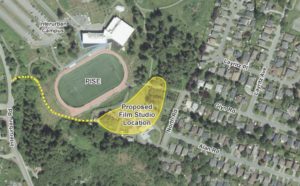On October 16, the BC NDP pledged $150,000 to Camosun for the “business case development” of a film studio on the Interurban campus. A business case is essentially a plan to make sure a project is financially viable.
“[The business case development is] to determine the cost of building classroom space for students and two sound stage and production facilities for the college as well as the film industry to use,” says NDP MLA and Camosun alumnus Rob Fleming, who completed the college’s University Transfer program in 1995. “We need to sharpen up what the cost of building that is and what the return on investment would be. So, this is really just for the business case, for government, to work—we hope—with the federal government and the college and the motion picture industry.”

Once all that is sorted out, Fleming says the NDP “would look at the scale of provincial contribution to get it done.” And once it’s done, it could have huge benefits for the college and for the island. According to Fleming, the island only makes up one percent of British Columbia’s total film GDP. And that is in large part due to lack of infrastructure. Having a film studio would “mean the ability to make the South island a major film production attractor,” he says.
“I think [BC’s total film GDP is] $3.2 billion; our industry here is only about $30 million. And you heard the film commissioner say that she thinks that could grow to $85, even $100 million. But even if the film stage had a more modest return, we have 1,000 members who belong to one of the film unions alone on the south island, that’s IATSE [International Alliance of Theatrical Stage Employees], and most of them never get to sleep in their bed at night—when they’re working, they’re not working in this region. And so, it’s about growth, but it’s also about retaining the talent we have in the film and TV production industry.”
Camosun vice president of partnerships Geoff Wilmshurst says a film studio would allow Camosun to “expand its educational offerings” as well as create “really well-paying jobs in south Vancouver Island.”
“[Camosun will] continue to work with the BC government, with the south Vancouver Island Film and Media Commission, the district of Saanich, and any interested private or public partners,” says Wilmshurst.
On top of the economic aspect, a film studio would mean a whole new avenue of learning for Camosun students. While the studio will likely not be completed in time for current students to consider it as an option, Camosun’s film production program could be a huge attractor for future students.
“The potential to have skilled jobs in production and post-production is a natural partnership for the film industry, and the site that Camosun has at Interurban is ideal,” says Fleming. “And you know we’ve got the Vancouver Island tech park there, so in terms of locating other commercial film companies and having a cluster of film and television, [there’s] tremendous potential.”
The NDP has just been re-elected in BC, with John Horgan as premier; Fleming says that supporting the film industry is part of their program to bring about a green economic recovery to the COVID-19 pandemic and to continue providing opportunities for young people.
“We know that we will be in a period of economic recovery and we want to be a government focused on creating jobs and opportunities for young people on the other side of the pandemic,” says Fleming, “and a good place for young people to be is gaining knowledge and skills for the jobs that will be part of the recovery, whether that’s in established green industries like film and television or emerging industries in a low-carbon future, or whether it’s focusing on jobs that are part of an aging workforce, where there’ll be significant opportunities from retirements, which involves everything from healthcare to traditional trades and technology jobs.”
